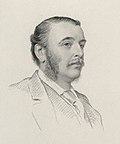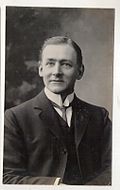Blackpool (UK Parliament constituency)
| Blackpool | |
|---|---|
| Former borough constituency for the House of Commons | |
| 1885–1945 | |
| Seats | one |
| Created from | North Lancashire |
| Replaced by | Blackpool North and Blackpool South |
Blackpool was a parliamentary constituency centred on the town of Blackpool in Lancashire. It returned one Member of Parliament (MP) to the House of Commons of the Parliament of the United Kingdom.
The constituency was created for the 1885 general election, and abolished for the 1945 general election, when it was replaced by the new Blackpool North and Blackpool South constituencies.
Boundaries
[edit]1885–1918: The Municipal Borough of Preston, the Sessional Divisions of Amounderness and Kirkham, and part of the Sessional Division of Leyland.
1918–1945: The County Borough of Blackpool, the Urban Districts of Bispham with Norbreck, Lytham, and St Anne's-on-Sea, and part of the parish of Carleton.
Members of Parliament
[edit]Election results
[edit]Elections in the 1880s
[edit]
| Party | Candidate | Votes | % | ±% | |
|---|---|---|---|---|---|
| Conservative | Frederick Stanley | Unopposed | |||
| Conservative win (new seat) | |||||
| Party | Candidate | Votes | % | ±% | |
|---|---|---|---|---|---|
| Conservative | Frederick Stanley | Unopposed | |||
| Conservative hold | |||||
Stanley was appointed President of the Board of Trade and elevated to the peerage, becoming Lord Stanley of Preston, requiring a by-election.

| Party | Candidate | Votes | % | ±% | |
|---|---|---|---|---|---|
| Conservative | Matthew White Ridley | 6,263 | 71.4 | N/A | |
| Liberal | John Ormerod Pilkington | 2,513 | 28.6 | New | |
| Majority | 3,750 | 42.8 | N/A | ||
| Turnout | 8,776 | 73.7 | N/A | ||
| Registered electors | 11,903 | ||||
| Conservative hold | Swing | N/A | |||
Elections in the 1890s
[edit]| Party | Candidate | Votes | % | ±% | |
|---|---|---|---|---|---|
| Conservative | Matthew White Ridley | 6,536 | 65.2 | N/A | |
| Liberal | Thomas Walker | 3,487 | 34.8 | N/A | |
| Majority | 3,049 | 30.4 | N/A | ||
| Turnout | 10,023 | 76.4 | N/A | ||
| Registered electors | 13,124 | ||||
| Conservative hold | Swing | N/A | |||
| Party | Candidate | Votes | % | ±% | |
|---|---|---|---|---|---|
| Conservative | Matthew White Ridley | Unopposed | |||
| Conservative hold | |||||
| Party | Candidate | Votes | % | ±% | |
|---|---|---|---|---|---|
| Conservative | Matthew White Ridley | Unopposed | |||
| Conservative hold | |||||
Elections in the 1900s
[edit]| Party | Candidate | Votes | % | ±% | |
|---|---|---|---|---|---|
| Conservative | Matthew White Ridley | Unopposed | |||
| Conservative hold | |||||
| Party | Candidate | Votes | % | ±% | |
|---|---|---|---|---|---|
| Conservative | Henry Worsley-Taylor | 7,059 | 55.8 | N/A | |
| Liberal | Joseph Heap | 5,589 | 44.2 | New | |
| Majority | 1,470 | 11.6 | N/A | ||
| Turnout | 12,648 | 5.3 | N/A | ||
| Registered electors | 16,807 | ||||
| Conservative hold | Swing | N/A | |||

| Party | Candidate | Votes | % | ±% | |
|---|---|---|---|---|---|
| Conservative | Wilfrid Ashley | 10,139 | 58.9 | N/A | |
| Liberal | Vivian Phillipps | 7,078 | 41.1 | N/A | |
| Majority | 3,061 | 17.8 | N/A | ||
| Turnout | 17,217 | 84.7 | N/A | ||
| Registered electors | 20,339 | ||||
| Conservative hold | Swing | N/A | |||
Elections in the 1910s
[edit]
| Party | Candidate | Votes | % | ±% | |
|---|---|---|---|---|---|
| Conservative | Wilfrid Ashley | 11,567 | 59.3 | +0.4 | |
| Liberal | Samuel Hodgkinson | 7,943 | 40.7 | −0.4 | |
| Majority | 3,624 | 18.6 | +0.8 | ||
| Turnout | 19,510 | 87.3 | +2.6 | ||
| Conservative hold | Swing | +0.4 | |||
| Party | Candidate | Votes | % | ±% | |
|---|---|---|---|---|---|
| Conservative | Wilfrid Ashley | Unopposed | |||
| Conservative hold | |||||
General Election 1914–15:
Another General Election was required to take place before the end of 1915. The political parties had been making preparations for an election to take place and by the July 1914, the following candidates had been selected;
- Unionist: Wilfrid Ashley
- Liberal:
| Party | Candidate | Votes | % | ±% | |
|---|---|---|---|---|---|
| C | Unionist | Albert Lindsay Parkinson | 15,818 | 55.9 | N/A |
| Independent Progressive | Clive F Critchley* | 9,862 | 34.9 | New | |
| Labour | Allan Gee | 2,608 | 9.2 | New | |
| Majority | 5,956 | 21.0 | N/A | ||
| Turnout | 28,288 | 68.0 | N/A | ||
| Registered electors | 41,627 | ||||
| Unionist hold | Swing | N/A | |||
| C indicates candidate endorsed by the coalition government. | |||||
* supported Coalition Government and received local Liberal Party support.
Elections in the 1920s
[edit]
| Party | Candidate | Votes | % | ±% | |
|---|---|---|---|---|---|
| Unionist | Leonard Molloy | 18,206 | 50.2 | −5.7 | |
| Liberal | Hugh Meyler | 18,040 | 49.8 | New | |
| Majority | 166 | 0.4 | −20.6 | ||
| Turnout | 36,246 | 78.3 | +10.3 | ||
| Registered electors | 46,292 | ||||
| Unionist hold | Swing | N/A | |||
| Party | Candidate | Votes | % | ±% | |
|---|---|---|---|---|---|
| Liberal | Hugh Meyler | 22,264 | 53.7 | +3.9 | |
| Unionist | Victor Stanley | 19,192 | 46.3 | −3.9 | |
| Majority | 3,072 | 7.4 | N/A | ||
| Turnout | 41,456 | 84.8 | +6.5 | ||
| Registered electors | 48,865 | ||||
| Liberal gain from Unionist | Swing | +3.9 | |||
| Party | Candidate | Votes | % | ±% | |
|---|---|---|---|---|---|
| Unionist | Walter de Frece | 25,839 | 58.0 | +11.7 | |
| Liberal | Hugh Meyler | 18,712 | 42.0 | −11.7 | |
| Majority | 7,127 | 16.0 | N/A | ||
| Turnout | 44,551 | 85.8 | +1.0 | ||
| Registered electors | 51,914 | ||||
| Unionist gain from Liberal | Swing | +11.7 | |||
| Party | Candidate | Votes | % | ±% | |
|---|---|---|---|---|---|
| Unionist | Walter de Frece | 32,912 | 46.8 | −11.2 | |
| Liberal | Miles Mitchell | 25,374 | 36.1 | −5.9 | |
| Labour | Ernest Alfred Machin | 12,049 | 17.1 | New | |
| Majority | 7,538 | 10.7 | −5.3 | ||
| Turnout | 70,335 | 81.1 | −4.7 | ||
| Registered electors | 86,744 | ||||
| Unionist hold | Swing | -2.7 | |||
Elections in the 1930s
[edit]| Party | Candidate | Votes | % | ±% | |
|---|---|---|---|---|---|
| Conservative | Clifford Erskine-Bolst | 53,010 | 73.1 | +26.3 | |
| Liberal | Edgar Wallace | 19,524 | 26.9 | −10.2 | |
| Majority | 33,486 | 46.2 | +35.5 | ||
| Turnout | 72,534 | ||||
| Conservative hold | Swing | ||||
- Wallace was opposed to the National Government

| Party | Candidate | Votes | % | ±% | |
|---|---|---|---|---|---|
| Conservative | Roland Robinson | 48,514 | 65.2 | −7.9 | |
| Labour | Harvey Thorneycroft | 13,598 | 18.3 | New | |
| Liberal | Henry Purchase | 12,245 | 16.47 | −10.4 | |
| Majority | 34,916 | 46.96 | +0.8 | ||
| Turnout | 74,357 | 73.97 | |||
| Conservative hold | Swing | ||||
Elections in the 1940s
[edit]General Election 1939–40: Another General Election was required to take place before the end of 1940. The political parties had been making preparations for an election to take place from 1939 and by the end of this year, the following candidates had been selected;
- Conservative: Roland Robinson
- Liberal: Adrian Liddell Hart
- Labour: Harvey Thorneycroft
References
[edit]- ^ a b c d e f g h i j k British Parliamentary Election Results 1885-1918, FWS Craig
- ^ a b c d e f The Liberal Year Book, 1907
- ^ Debrett's House of Commons & Judicial Bench, 1886
- ^ a b The Constitutional Year Book, 1904, published by Conservative Central Office, page 146 (170 in web page), Lancashire North
- ^ a b Debrett's House of Commons & Judicial Bench, 1901
- ^ a b Debrett's House of Commons & Judicial Bench, 1916
- ^ a b British Parliamentary Election Results 1918-49, FWS Craig
Craig, F. W. S. (1983). British parliamentary election results 1918-1949 (3 ed.). Chichester: Parliamentary Research Services. ISBN 0-900178-06-X.
